BMO6630 - Analyzing Customer Satisfaction in the Hospitality Sector
VerifiedAdded on 2023/06/07
|6
|1522
|54
Report
AI Summary
This report provides a structured review of customer satisfaction within the hospitality industry, drawing upon four academic articles. It explores the theoretical concepts related to customer satisfaction, its progression over the years, and its significance as a key strategy for hotels to enhance performance and sustainability. The review highlights common findings across the articles, such as the importance of customer satisfaction in driving brand loyalty and repeat business. It also addresses differences in research methodologies, study limitations including the difficulty in measuring customer satisfaction and budget constraints, and proposes future research directions focusing on the interplay between customer satisfaction and other factors like consumer behavior and emotions. The report concludes that while customer satisfaction is crucial, further research is needed to explore its relationship with allied services in the hospitality sector.
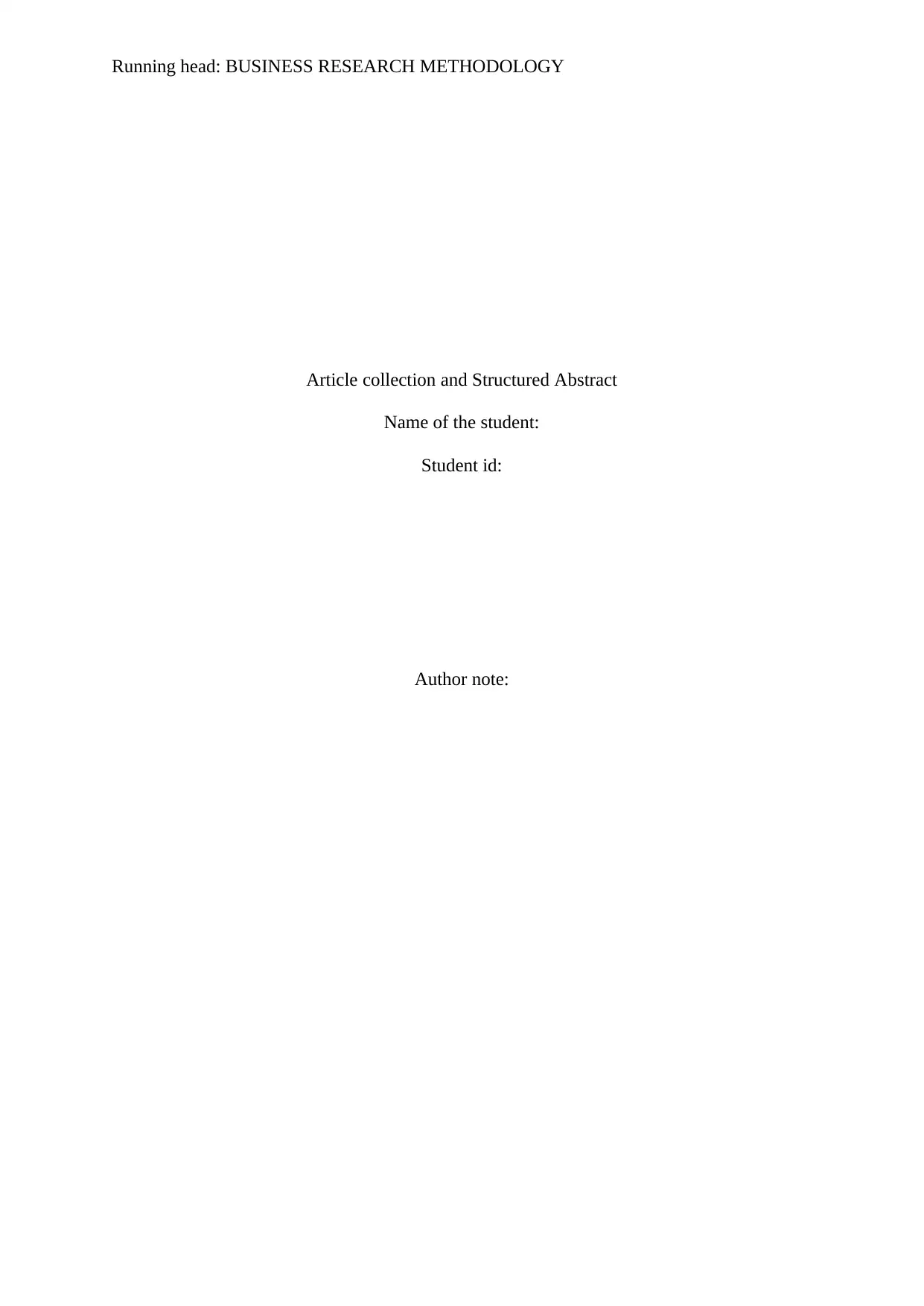
Running head: BUSINESS RESEARCH METHODOLOGY
Article collection and Structured Abstract
Name of the student:
Student id:
Author note:
Article collection and Structured Abstract
Name of the student:
Student id:
Author note:
Paraphrase This Document
Need a fresh take? Get an instant paraphrase of this document with our AI Paraphraser
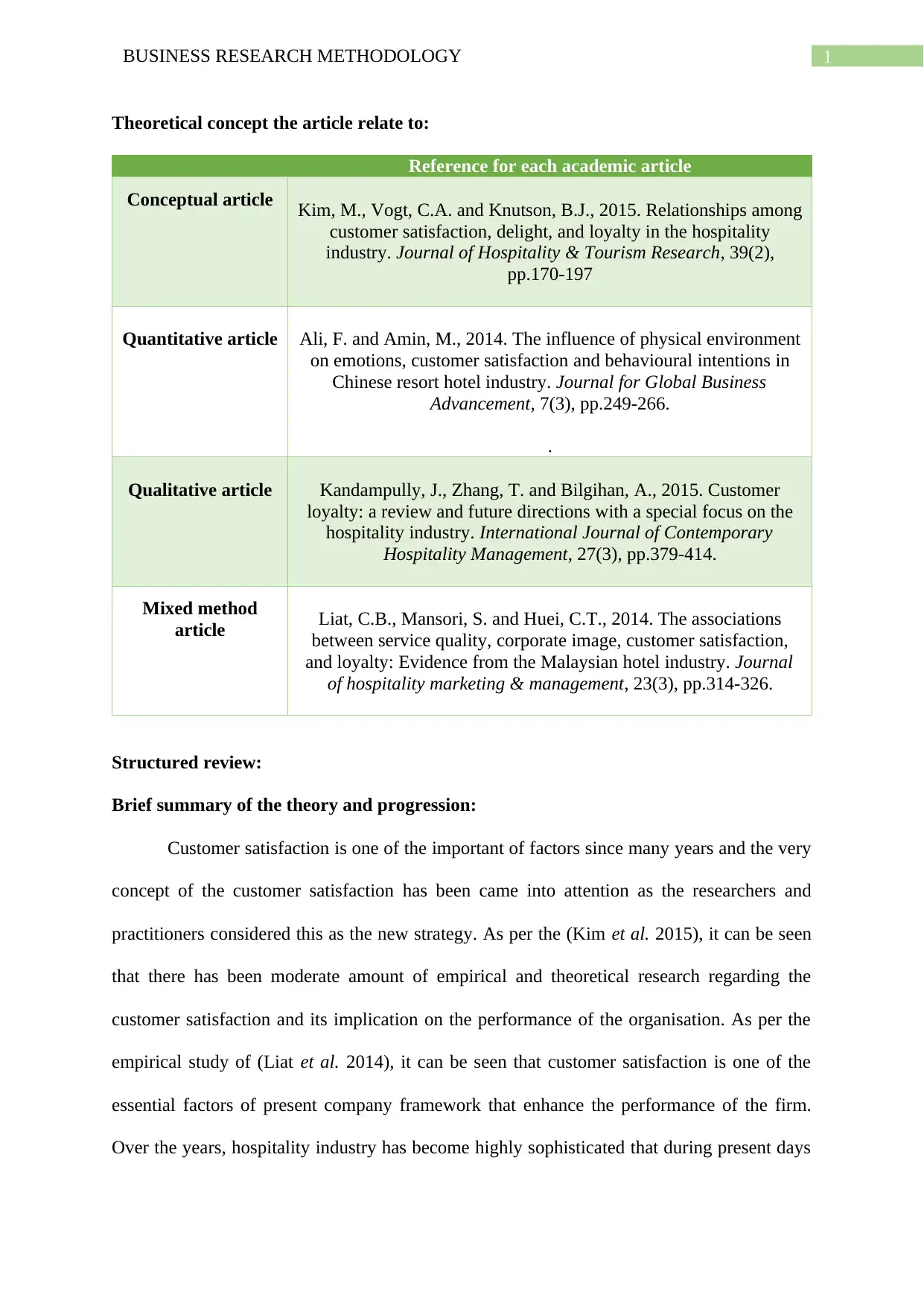
1BUSINESS RESEARCH METHODOLOGY
Theoretical concept the article relate to:
Reference for each academic article
Conceptual article Kim, M., Vogt, C.A. and Knutson, B.J., 2015. Relationships among
customer satisfaction, delight, and loyalty in the hospitality
industry. Journal of Hospitality & Tourism Research, 39(2),
pp.170-197
Quantitative article Ali, F. and Amin, M., 2014. The influence of physical environment
on emotions, customer satisfaction and behavioural intentions in
Chinese resort hotel industry. Journal for Global Business
Advancement, 7(3), pp.249-266.
.
Qualitative article Kandampully, J., Zhang, T. and Bilgihan, A., 2015. Customer
loyalty: a review and future directions with a special focus on the
hospitality industry. International Journal of Contemporary
Hospitality Management, 27(3), pp.379-414.
Mixed method
article Liat, C.B., Mansori, S. and Huei, C.T., 2014. The associations
between service quality, corporate image, customer satisfaction,
and loyalty: Evidence from the Malaysian hotel industry. Journal
of hospitality marketing & management, 23(3), pp.314-326.
Structured review:
Brief summary of the theory and progression:
Customer satisfaction is one of the important of factors since many years and the very
concept of the customer satisfaction has been came into attention as the researchers and
practitioners considered this as the new strategy. As per the (Kim et al. 2015), it can be seen
that there has been moderate amount of empirical and theoretical research regarding the
customer satisfaction and its implication on the performance of the organisation. As per the
empirical study of (Liat et al. 2014), it can be seen that customer satisfaction is one of the
essential factors of present company framework that enhance the performance of the firm.
Over the years, hospitality industry has become highly sophisticated that during present days
Theoretical concept the article relate to:
Reference for each academic article
Conceptual article Kim, M., Vogt, C.A. and Knutson, B.J., 2015. Relationships among
customer satisfaction, delight, and loyalty in the hospitality
industry. Journal of Hospitality & Tourism Research, 39(2),
pp.170-197
Quantitative article Ali, F. and Amin, M., 2014. The influence of physical environment
on emotions, customer satisfaction and behavioural intentions in
Chinese resort hotel industry. Journal for Global Business
Advancement, 7(3), pp.249-266.
.
Qualitative article Kandampully, J., Zhang, T. and Bilgihan, A., 2015. Customer
loyalty: a review and future directions with a special focus on the
hospitality industry. International Journal of Contemporary
Hospitality Management, 27(3), pp.379-414.
Mixed method
article Liat, C.B., Mansori, S. and Huei, C.T., 2014. The associations
between service quality, corporate image, customer satisfaction,
and loyalty: Evidence from the Malaysian hotel industry. Journal
of hospitality marketing & management, 23(3), pp.314-326.
Structured review:
Brief summary of the theory and progression:
Customer satisfaction is one of the important of factors since many years and the very
concept of the customer satisfaction has been came into attention as the researchers and
practitioners considered this as the new strategy. As per the (Kim et al. 2015), it can be seen
that there has been moderate amount of empirical and theoretical research regarding the
customer satisfaction and its implication on the performance of the organisation. As per the
empirical study of (Liat et al. 2014), it can be seen that customer satisfaction is one of the
essential factors of present company framework that enhance the performance of the firm.
Over the years, hospitality industry has become highly sophisticated that during present days
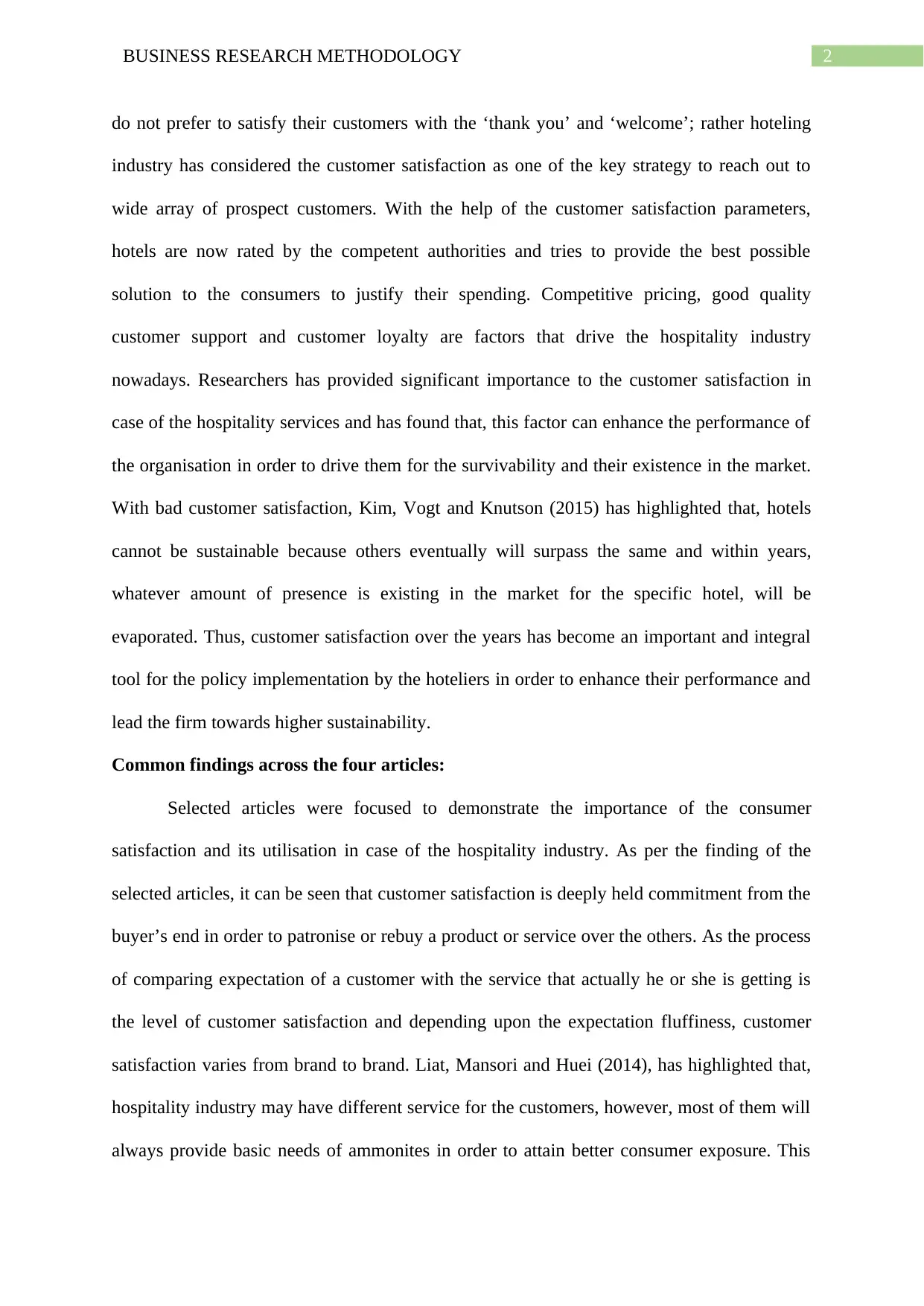
2BUSINESS RESEARCH METHODOLOGY
do not prefer to satisfy their customers with the ‘thank you’ and ‘welcome’; rather hoteling
industry has considered the customer satisfaction as one of the key strategy to reach out to
wide array of prospect customers. With the help of the customer satisfaction parameters,
hotels are now rated by the competent authorities and tries to provide the best possible
solution to the consumers to justify their spending. Competitive pricing, good quality
customer support and customer loyalty are factors that drive the hospitality industry
nowadays. Researchers has provided significant importance to the customer satisfaction in
case of the hospitality services and has found that, this factor can enhance the performance of
the organisation in order to drive them for the survivability and their existence in the market.
With bad customer satisfaction, Kim, Vogt and Knutson (2015) has highlighted that, hotels
cannot be sustainable because others eventually will surpass the same and within years,
whatever amount of presence is existing in the market for the specific hotel, will be
evaporated. Thus, customer satisfaction over the years has become an important and integral
tool for the policy implementation by the hoteliers in order to enhance their performance and
lead the firm towards higher sustainability.
Common findings across the four articles:
Selected articles were focused to demonstrate the importance of the consumer
satisfaction and its utilisation in case of the hospitality industry. As per the finding of the
selected articles, it can be seen that customer satisfaction is deeply held commitment from the
buyer’s end in order to patronise or rebuy a product or service over the others. As the process
of comparing expectation of a customer with the service that actually he or she is getting is
the level of customer satisfaction and depending upon the expectation fluffiness, customer
satisfaction varies from brand to brand. Liat, Mansori and Huei (2014), has highlighted that,
hospitality industry may have different service for the customers, however, most of them will
always provide basic needs of ammonites in order to attain better consumer exposure. This
do not prefer to satisfy their customers with the ‘thank you’ and ‘welcome’; rather hoteling
industry has considered the customer satisfaction as one of the key strategy to reach out to
wide array of prospect customers. With the help of the customer satisfaction parameters,
hotels are now rated by the competent authorities and tries to provide the best possible
solution to the consumers to justify their spending. Competitive pricing, good quality
customer support and customer loyalty are factors that drive the hospitality industry
nowadays. Researchers has provided significant importance to the customer satisfaction in
case of the hospitality services and has found that, this factor can enhance the performance of
the organisation in order to drive them for the survivability and their existence in the market.
With bad customer satisfaction, Kim, Vogt and Knutson (2015) has highlighted that, hotels
cannot be sustainable because others eventually will surpass the same and within years,
whatever amount of presence is existing in the market for the specific hotel, will be
evaporated. Thus, customer satisfaction over the years has become an important and integral
tool for the policy implementation by the hoteliers in order to enhance their performance and
lead the firm towards higher sustainability.
Common findings across the four articles:
Selected articles were focused to demonstrate the importance of the consumer
satisfaction and its utilisation in case of the hospitality industry. As per the finding of the
selected articles, it can be seen that customer satisfaction is deeply held commitment from the
buyer’s end in order to patronise or rebuy a product or service over the others. As the process
of comparing expectation of a customer with the service that actually he or she is getting is
the level of customer satisfaction and depending upon the expectation fluffiness, customer
satisfaction varies from brand to brand. Liat, Mansori and Huei (2014), has highlighted that,
hospitality industry may have different service for the customers, however, most of them will
always provide basic needs of ammonites in order to attain better consumer exposure. This
⊘ This is a preview!⊘
Do you want full access?
Subscribe today to unlock all pages.

Trusted by 1+ million students worldwide
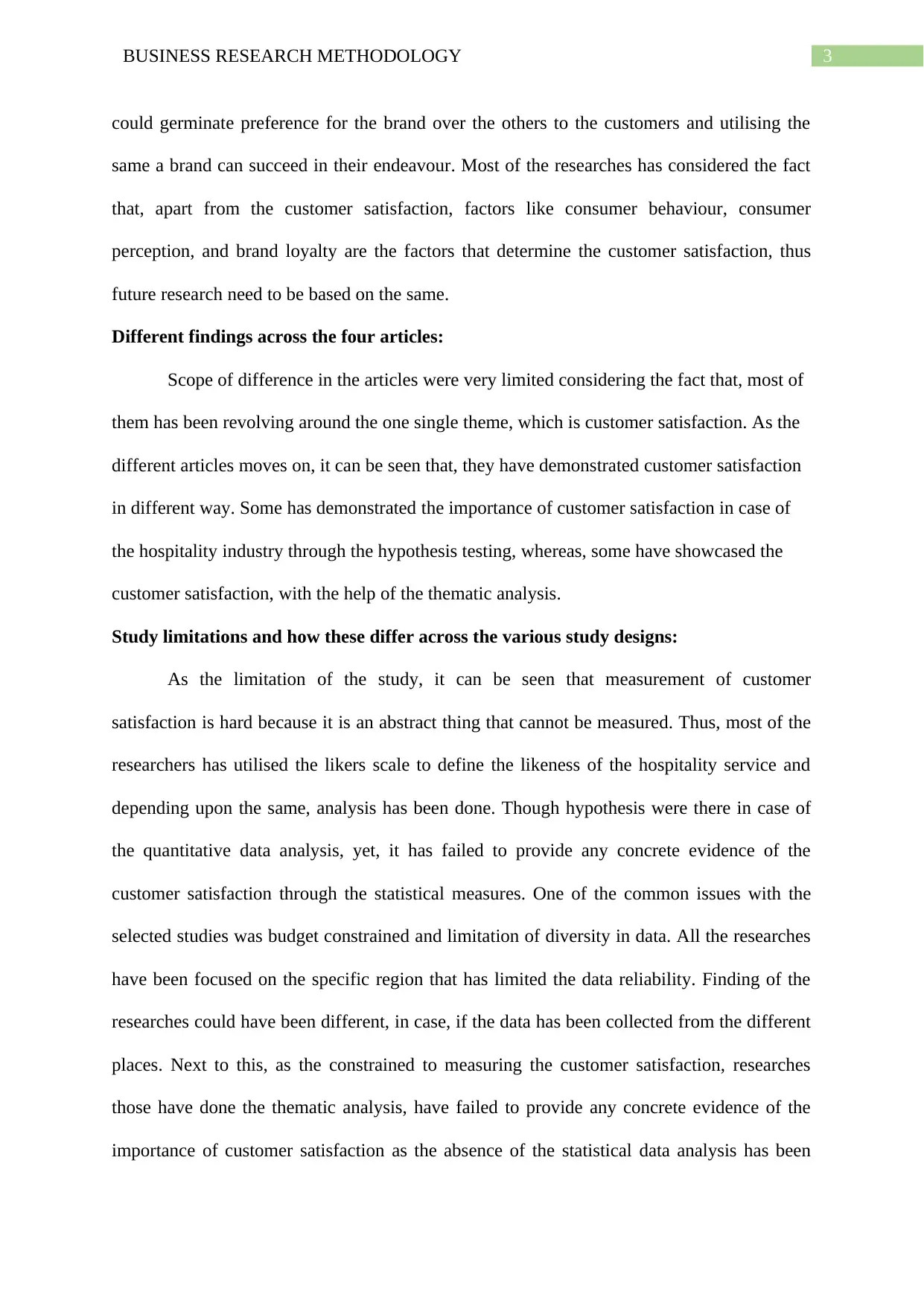
3BUSINESS RESEARCH METHODOLOGY
could germinate preference for the brand over the others to the customers and utilising the
same a brand can succeed in their endeavour. Most of the researches has considered the fact
that, apart from the customer satisfaction, factors like consumer behaviour, consumer
perception, and brand loyalty are the factors that determine the customer satisfaction, thus
future research need to be based on the same.
Different findings across the four articles:
Scope of difference in the articles were very limited considering the fact that, most of
them has been revolving around the one single theme, which is customer satisfaction. As the
different articles moves on, it can be seen that, they have demonstrated customer satisfaction
in different way. Some has demonstrated the importance of customer satisfaction in case of
the hospitality industry through the hypothesis testing, whereas, some have showcased the
customer satisfaction, with the help of the thematic analysis.
Study limitations and how these differ across the various study designs:
As the limitation of the study, it can be seen that measurement of customer
satisfaction is hard because it is an abstract thing that cannot be measured. Thus, most of the
researchers has utilised the likers scale to define the likeness of the hospitality service and
depending upon the same, analysis has been done. Though hypothesis were there in case of
the quantitative data analysis, yet, it has failed to provide any concrete evidence of the
customer satisfaction through the statistical measures. One of the common issues with the
selected studies was budget constrained and limitation of diversity in data. All the researches
have been focused on the specific region that has limited the data reliability. Finding of the
researches could have been different, in case, if the data has been collected from the different
places. Next to this, as the constrained to measuring the customer satisfaction, researches
those have done the thematic analysis, have failed to provide any concrete evidence of the
importance of customer satisfaction as the absence of the statistical data analysis has been
could germinate preference for the brand over the others to the customers and utilising the
same a brand can succeed in their endeavour. Most of the researches has considered the fact
that, apart from the customer satisfaction, factors like consumer behaviour, consumer
perception, and brand loyalty are the factors that determine the customer satisfaction, thus
future research need to be based on the same.
Different findings across the four articles:
Scope of difference in the articles were very limited considering the fact that, most of
them has been revolving around the one single theme, which is customer satisfaction. As the
different articles moves on, it can be seen that, they have demonstrated customer satisfaction
in different way. Some has demonstrated the importance of customer satisfaction in case of
the hospitality industry through the hypothesis testing, whereas, some have showcased the
customer satisfaction, with the help of the thematic analysis.
Study limitations and how these differ across the various study designs:
As the limitation of the study, it can be seen that measurement of customer
satisfaction is hard because it is an abstract thing that cannot be measured. Thus, most of the
researchers has utilised the likers scale to define the likeness of the hospitality service and
depending upon the same, analysis has been done. Though hypothesis were there in case of
the quantitative data analysis, yet, it has failed to provide any concrete evidence of the
customer satisfaction through the statistical measures. One of the common issues with the
selected studies was budget constrained and limitation of diversity in data. All the researches
have been focused on the specific region that has limited the data reliability. Finding of the
researches could have been different, in case, if the data has been collected from the different
places. Next to this, as the constrained to measuring the customer satisfaction, researches
those have done the thematic analysis, have failed to provide any concrete evidence of the
importance of customer satisfaction as the absence of the statistical data analysis has been
Paraphrase This Document
Need a fresh take? Get an instant paraphrase of this document with our AI Paraphraser
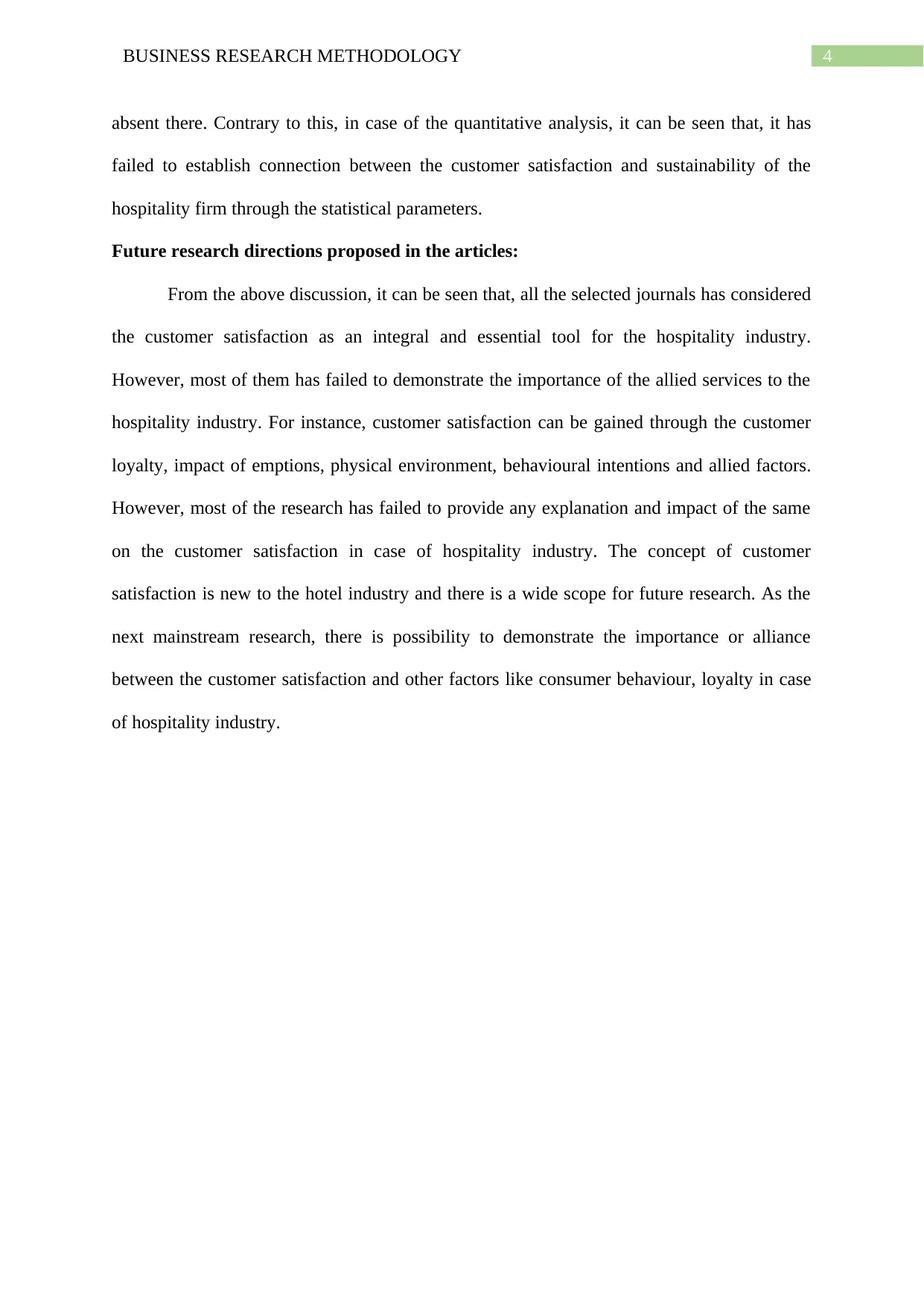
4BUSINESS RESEARCH METHODOLOGY
absent there. Contrary to this, in case of the quantitative analysis, it can be seen that, it has
failed to establish connection between the customer satisfaction and sustainability of the
hospitality firm through the statistical parameters.
Future research directions proposed in the articles:
From the above discussion, it can be seen that, all the selected journals has considered
the customer satisfaction as an integral and essential tool for the hospitality industry.
However, most of them has failed to demonstrate the importance of the allied services to the
hospitality industry. For instance, customer satisfaction can be gained through the customer
loyalty, impact of emptions, physical environment, behavioural intentions and allied factors.
However, most of the research has failed to provide any explanation and impact of the same
on the customer satisfaction in case of hospitality industry. The concept of customer
satisfaction is new to the hotel industry and there is a wide scope for future research. As the
next mainstream research, there is possibility to demonstrate the importance or alliance
between the customer satisfaction and other factors like consumer behaviour, loyalty in case
of hospitality industry.
absent there. Contrary to this, in case of the quantitative analysis, it can be seen that, it has
failed to establish connection between the customer satisfaction and sustainability of the
hospitality firm through the statistical parameters.
Future research directions proposed in the articles:
From the above discussion, it can be seen that, all the selected journals has considered
the customer satisfaction as an integral and essential tool for the hospitality industry.
However, most of them has failed to demonstrate the importance of the allied services to the
hospitality industry. For instance, customer satisfaction can be gained through the customer
loyalty, impact of emptions, physical environment, behavioural intentions and allied factors.
However, most of the research has failed to provide any explanation and impact of the same
on the customer satisfaction in case of hospitality industry. The concept of customer
satisfaction is new to the hotel industry and there is a wide scope for future research. As the
next mainstream research, there is possibility to demonstrate the importance or alliance
between the customer satisfaction and other factors like consumer behaviour, loyalty in case
of hospitality industry.
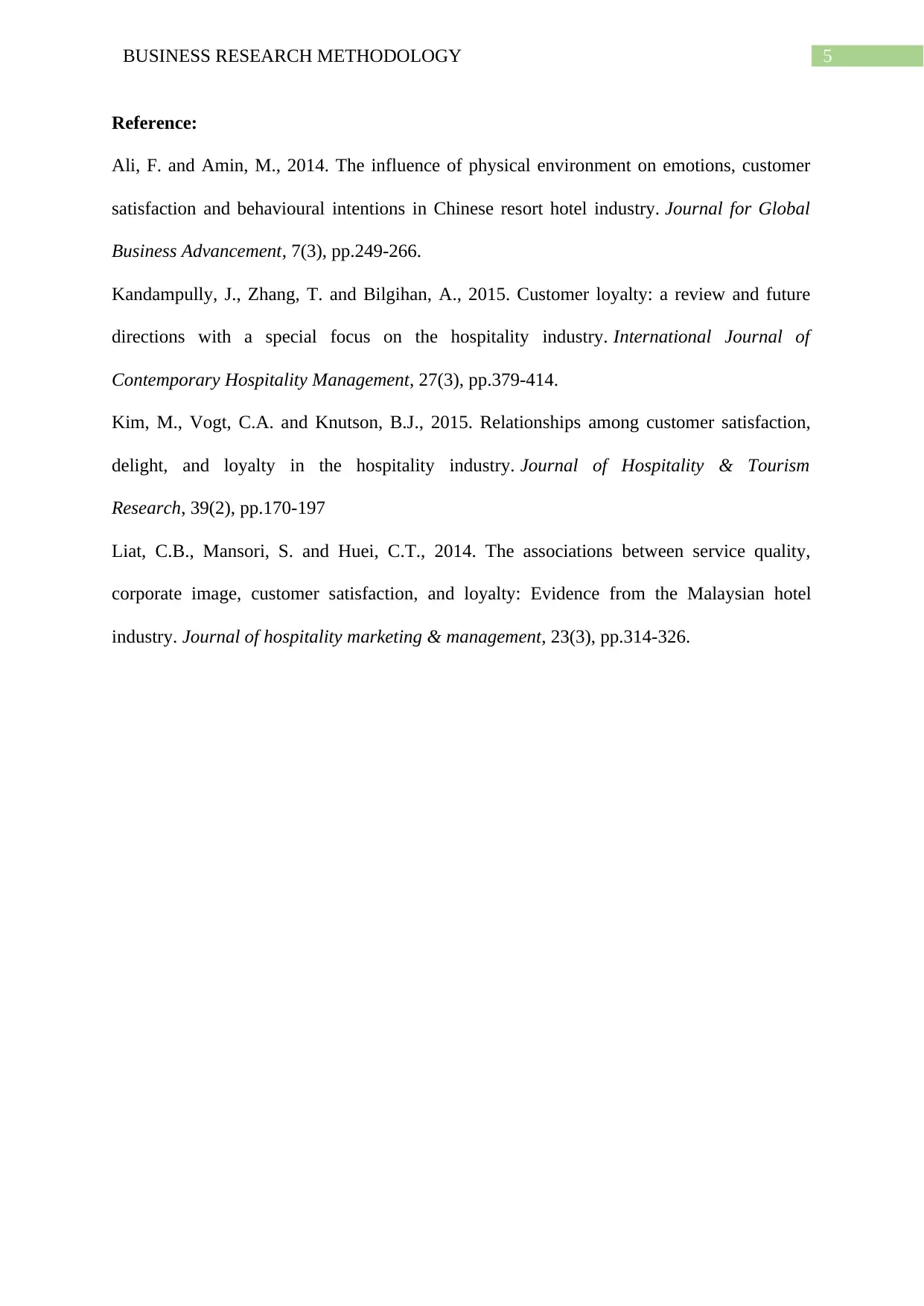
5BUSINESS RESEARCH METHODOLOGY
Reference:
Ali, F. and Amin, M., 2014. The influence of physical environment on emotions, customer
satisfaction and behavioural intentions in Chinese resort hotel industry. Journal for Global
Business Advancement, 7(3), pp.249-266.
Kandampully, J., Zhang, T. and Bilgihan, A., 2015. Customer loyalty: a review and future
directions with a special focus on the hospitality industry. International Journal of
Contemporary Hospitality Management, 27(3), pp.379-414.
Kim, M., Vogt, C.A. and Knutson, B.J., 2015. Relationships among customer satisfaction,
delight, and loyalty in the hospitality industry. Journal of Hospitality & Tourism
Research, 39(2), pp.170-197
Liat, C.B., Mansori, S. and Huei, C.T., 2014. The associations between service quality,
corporate image, customer satisfaction, and loyalty: Evidence from the Malaysian hotel
industry. Journal of hospitality marketing & management, 23(3), pp.314-326.
Reference:
Ali, F. and Amin, M., 2014. The influence of physical environment on emotions, customer
satisfaction and behavioural intentions in Chinese resort hotel industry. Journal for Global
Business Advancement, 7(3), pp.249-266.
Kandampully, J., Zhang, T. and Bilgihan, A., 2015. Customer loyalty: a review and future
directions with a special focus on the hospitality industry. International Journal of
Contemporary Hospitality Management, 27(3), pp.379-414.
Kim, M., Vogt, C.A. and Knutson, B.J., 2015. Relationships among customer satisfaction,
delight, and loyalty in the hospitality industry. Journal of Hospitality & Tourism
Research, 39(2), pp.170-197
Liat, C.B., Mansori, S. and Huei, C.T., 2014. The associations between service quality,
corporate image, customer satisfaction, and loyalty: Evidence from the Malaysian hotel
industry. Journal of hospitality marketing & management, 23(3), pp.314-326.
⊘ This is a preview!⊘
Do you want full access?
Subscribe today to unlock all pages.

Trusted by 1+ million students worldwide
1 out of 6
Related Documents
Your All-in-One AI-Powered Toolkit for Academic Success.
+13062052269
info@desklib.com
Available 24*7 on WhatsApp / Email
![[object Object]](/_next/static/media/star-bottom.7253800d.svg)
Unlock your academic potential
Copyright © 2020–2025 A2Z Services. All Rights Reserved. Developed and managed by ZUCOL.




